Everyone knows that chickens are a classic farmyard animal, but increasingly, people everywhere are choosing to keep them not only for their eggs but also as friendly pets too!
Chickens are great pets to have, whether they’re outdoor pets with egg benefits or more traditional pets. They are easy to care for, are a low-maintenance animals, and are absolutely hilarious to watch. Chickens are a welcome addition to almost any homestead or household.
Are you thinking about keeping chickens as pets? Here’s our guide to whether they make good pets (spoiler alert, they do), as well as how you should go about living with your new feathered friends!
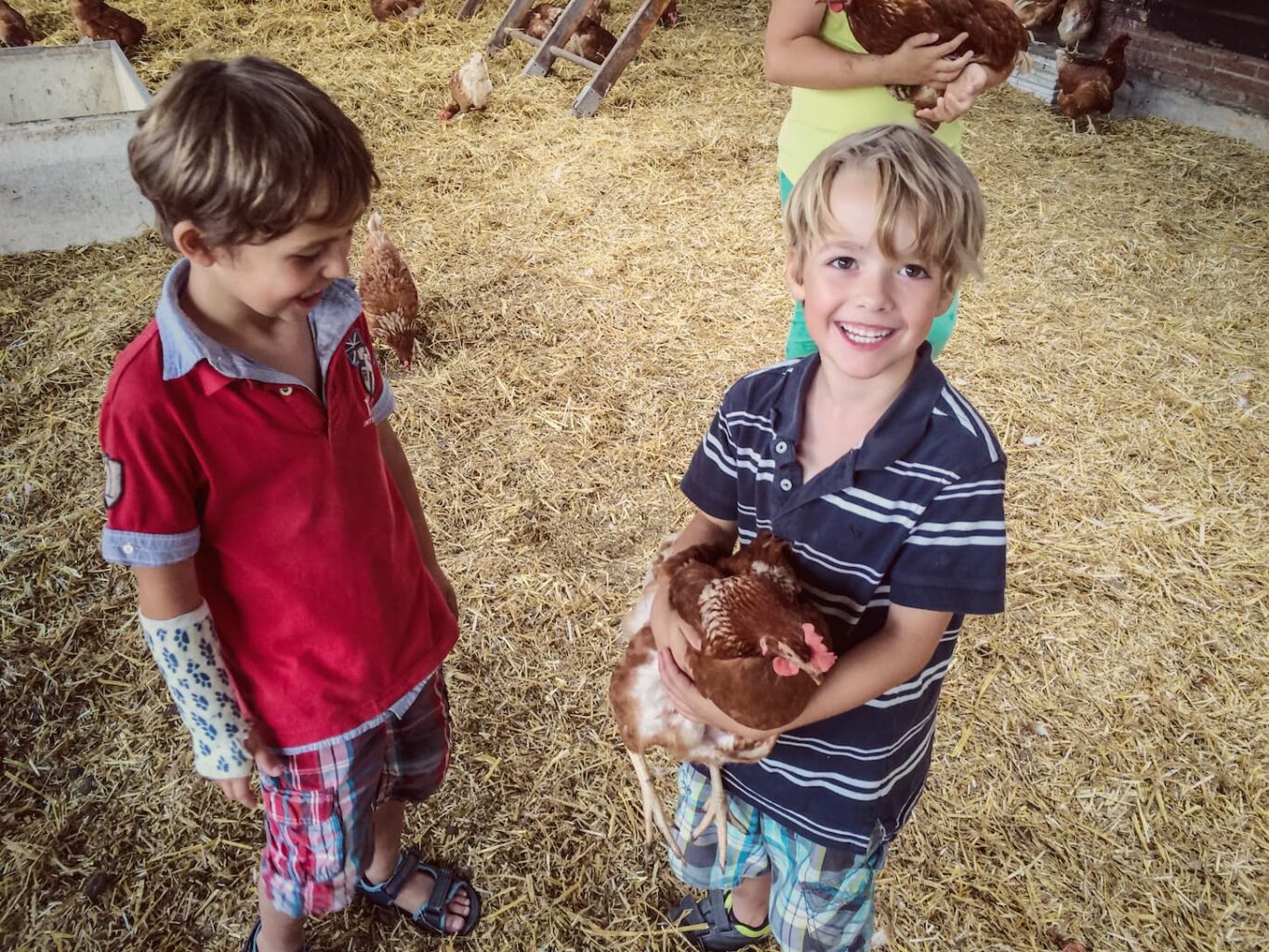
Are Chickens Easy to Care For?
Chickens are generally easy to care for as either a pet or livestock. They simply require enough food, water, space to forage, and a flock to socialize and stay safe.
One of the first concerns that people have about keeping chickens as pets is whether they are difficult to care for. Don’t worry, as they’re not too tricky!
There are, however, some things that you’ll need to know before getting any chickens; particularly about where to keep your chickens, what to feed them, and how to keep them healthy.
The key to making chickens easy to care for is having systems in place to make it easier. For example, using a feeding system to hold their feed will make remembering to feed your chickens a lot easier. You’ll only have to remember it once every few days or once a week. It’s the same with their water, bedding, and more.
You will have to collect the eggs daily, though. There’s not a good way around that – unless you can delegate egg collection to your children!
Is Having a Pet Chicken a Good Idea?
Having a pet chicken can be a good idea if there is sufficient space and resources for both a chicken and its accompanying flock. Chickens need at least 2-3 other chickens to feel safe in a flock.
Keeping chickens can be a great idea; they make good pets and provide eggs for you. However, you’ll need to be sure that you can provide adequate care before deciding to get one.
Personally, I think keeping chickens is an awesome decision. With chickens as pets, you won’t just have animal companions; you’ll also have a constant source of fresh eggs! Chickens are even suitable as city pets, and there’s been a massive uptake in people keeping them in their backyards.
There are of course some provisos to that; if you live close to your neighbors, they might not be the biggest fans of you deciding to get a rooster.
In fact, that’s precisely why we, even on our half-acre, opted against getting a rooster. Our neighbors don’t mind our hens (and some of our neighbors even love seeing them forage), and we’d like to keep it that way.
Of course, you’ll also need to be sure that you’re capable of looking after the chicken properly. Like any animal, chickens need suitable care, including nutrition, housing, stimulation, and perhaps a bit of love and affection.
Unsure if that’s for you? Read on to find out more about all the different things you need to do to look after a chicken!
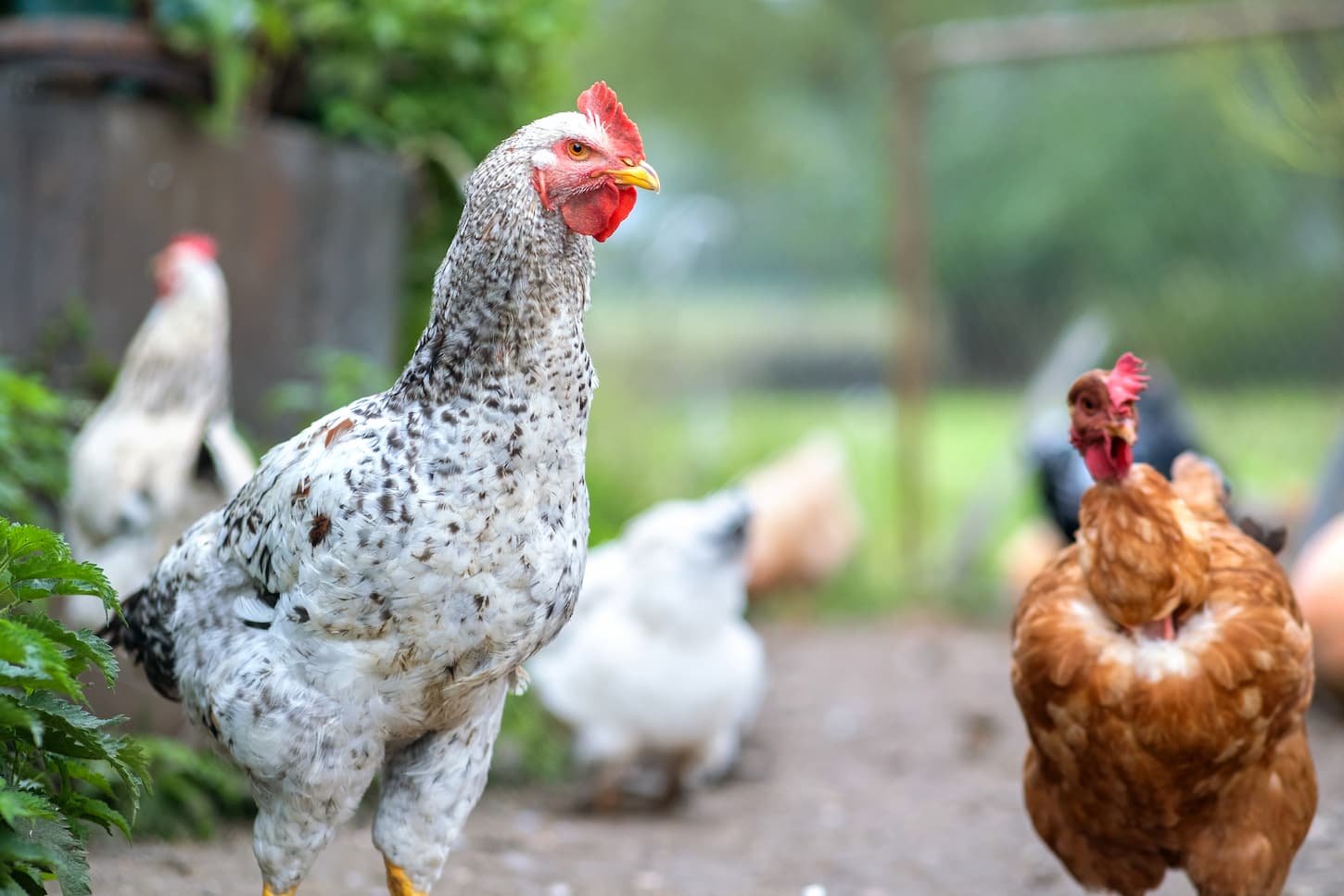
Can You Have a Chicken as a House Pet?
While chickens make awesome backyard pets, they’re a bit trickier to keep indoors without a cage. Chickens aren’t house-trainable, so with a free-range indoor chicken, you would be likely to find your house somewhat covered in chicken poop.
Some companies sell chicken diapers, but veterinary advice on this is mixed. At the very least (or in a best-case scenario) these are inconvenient. But in a worst-case scenario and at most, they may present a health hazard to your pet chicken.
That said, many people do keep chickens inside, and it’s certainly possible to do so! Like any animal, the personality of each chicken is unique, so you might find some chickens enjoying the human company and the warmth indoors, while others prefer a more traditional outdoor and coop setting for themselves.
The most important thing is that chickens need an environment well suited to their basic needs. Chickens enjoy nesting and pecking the ground, and your carpet floor isn’t likely to let them forage for grass and insects in the same way they would in your backyard (at least, I hope so).
It is possible to keep chickens in indoor cages but to live a good life they need daily exercise outside confined spaces.
However, this doesn’t mean that chickens have to be left out in the yard, just to provide eggs! Chickens are great companion animals, fun to play with, and many breeds actively enjoy interacting with human company.
Chickens also have distinct personalities, and it can be fun to learn each of their little quirks just like you would with any other pet.
Pro tip: I don’t think Mayor Goodway from Paw Patrol would realistically be able to keep a purse chicken, although Chicoletta is good-natured enough that just maybe they can pull it off. I do worry that Chicoletta needs more feathered friends, though. Maybe she wouldn’t wander off so frequently if she had a flock.
Now you know what I’ve been watching with my children lately!
How Long Do Chickens Live as House Pets?
Some pet chickens have been known to live as long as 20 years. Chickens can generally live between 5-10 years. When kept as a pet, a chicken’s improved diet and lifestyle may help them live longer than the usual 5-10 years.
If you’re after more detail about the lifespan of chickens, we’ve got you covered! You can find out all you need to know about how long chickens live as pets here.
Our chickens are 2-3 years old and still going strong as outdoor pets with egg benefits.
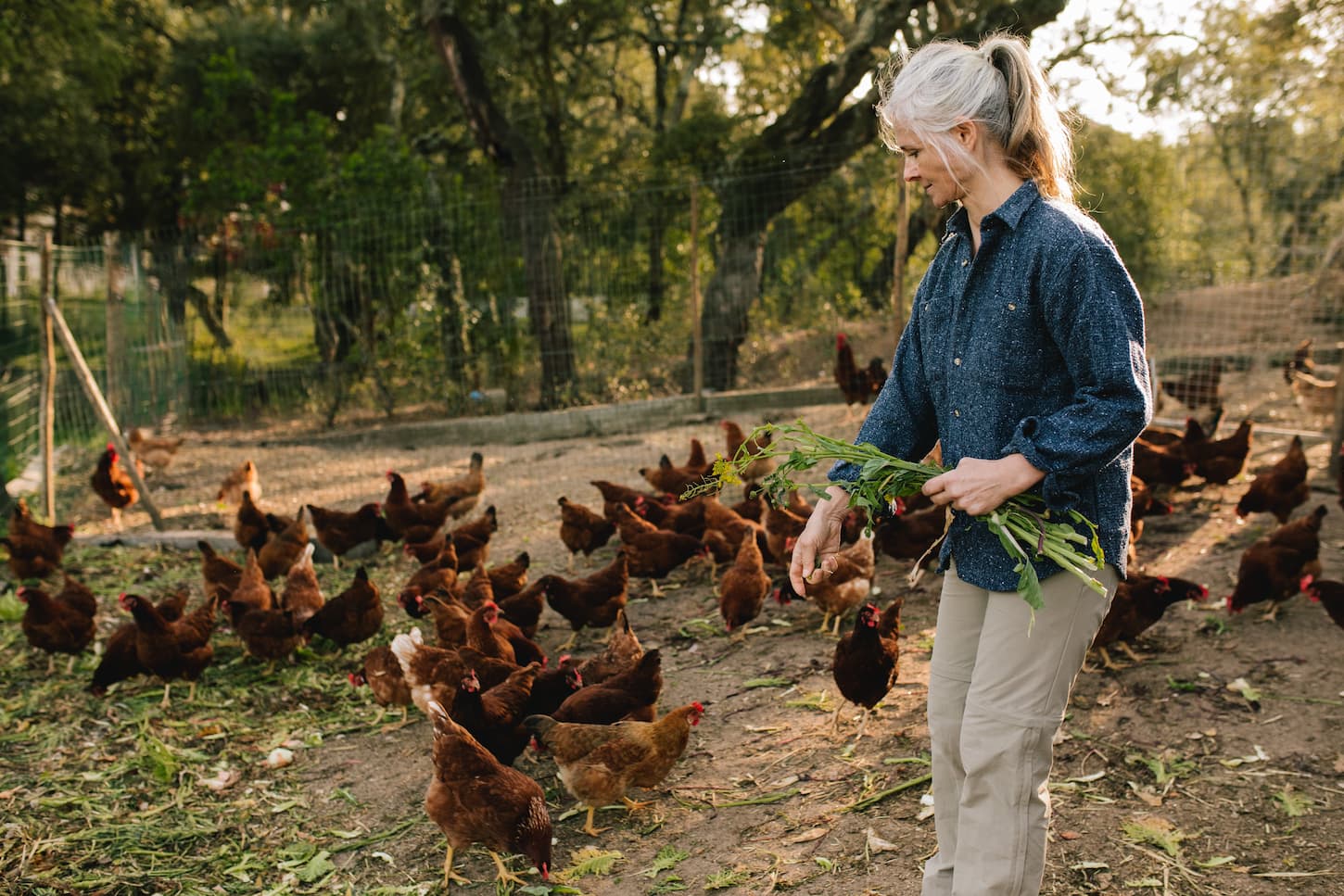
Do chickens make good house pets?
Chickens can make great house pets. They are fantastic companions who provide free eggs! Just be aware that chickens cannot be house-trained, so they will poop anywhere they have access to while roaming.
Here’s a breakdown of some of the main reasons that I think chickens are good house pets.
Reason #1: Pet chickens lay eggs
When you have chickens, you get a constant supply of eggs, fresh from your backyard. Or from the inside, if you’re keeping your chicken indoors.
You won’t need to pop down to the shops for eggs anymore! Fresh eggs are bigger and tastier than store-bought alternatives.
Recently, we bought some store-bought eggs just to compare. While our eggs used to measure the same as a medium AA egg, it seems like the definition of egg sizes may have been hit by the shrink ray: our eggs haven’t changed, but they’re significantly larger than the store-bought eggs now!
Reason #2: Friendly feathered friends are the best
Chickens can make great companion animals. They’re well known for distinct personalities, with some enjoying human company, some keeping to themselves, and some always letting their curiosity get the better of them!
Remember how we already talked about Chicoletta the purse chicken from Paw Patrol? Okay. So that chicken is fictional, but our chickens will totally let you carry them around like that. So while Chicoletta isn’t real, she’s pretty realistic for an animated chicken.
Reason #3: Chickens are cheap and easy to look after
Aside from the initial setup, chickens are some of the cheapest and easiest animals to look after. They’re generally pretty content amongst themselves, although there are some small things that you’ll need to do to keep them healthy and keep them (and you) entertained.
Keep reading to find out more about this later in the article. Don’t worry – I won’t leave you hanging.
Reason #4: Common concerns about keeping chickens (as livestock or pets) are usually myths
Common concerns about chickens are whether they’re noisy or smelly. We’ve gone a little more into these questions in a couple of different articles, which I’ve included below. Spoiler alert: they’re not particularly guilty on either count!
- Exactly How Noisy Are Chickens? A 12-Month Chicken Sound Diary
- Is It Smelly to Keep Chickens? (What You Need to Know)
Now, if you do have smelly or noisy chickens, know that there’s something wrong. It’s usually related to a system that needs fixing. And once it’s fixed? You’ll have a smell-free, fun time with chickens (who aren’t as noisy as you think they are).
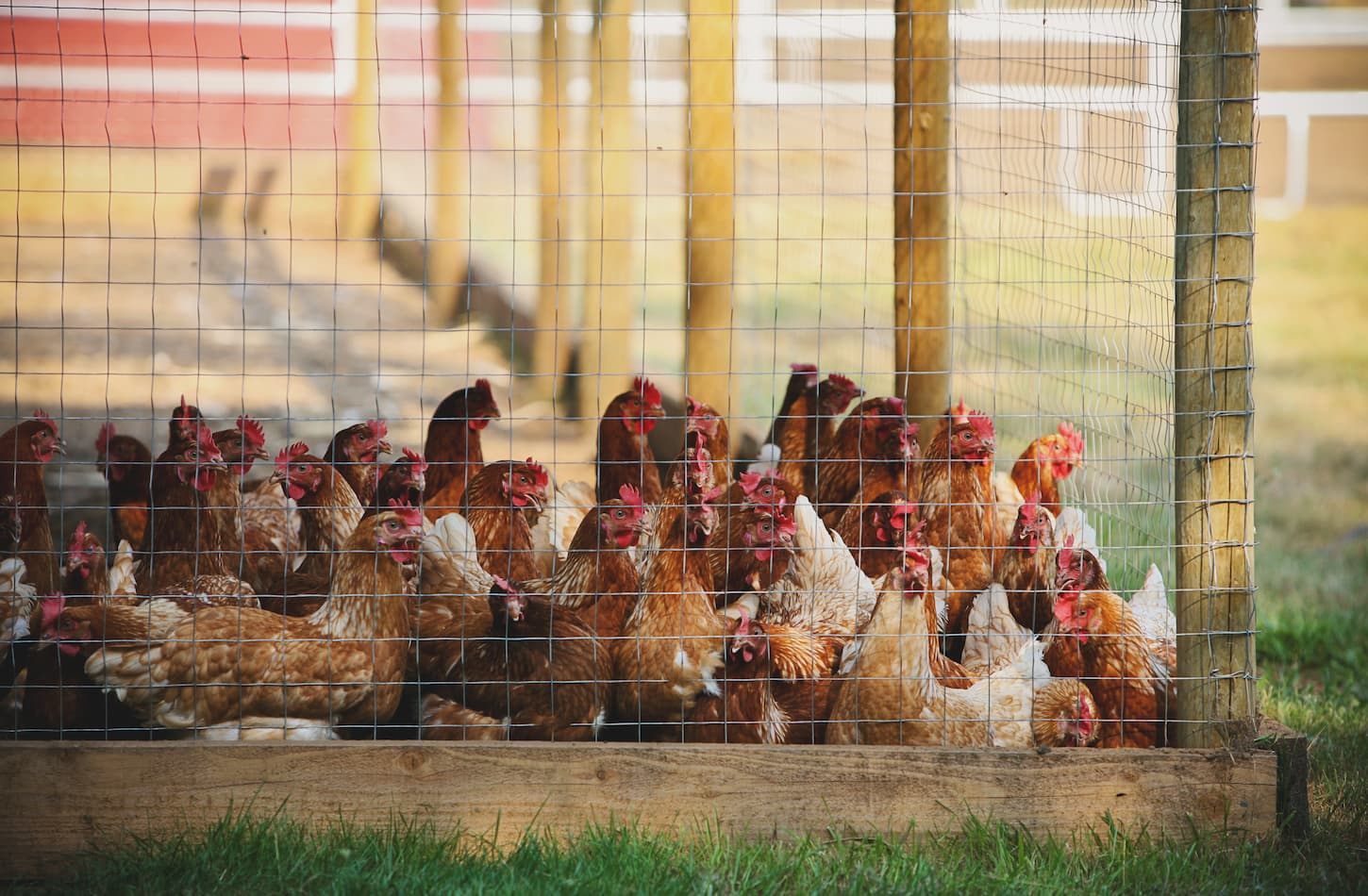
Are Chickens High-Maintenance Pets?
Chickens are relatively low-maintenance pets. Although there’s a little effort involved in setting up a chicken’s coop, there’s not too much work to do. However, like any animal, they do have needs that have to be met so if you’re thinking of getting chickens make sure you’re prepared to accommodate them.
Setting up your chicken run is maybe the most work that you’ll have to put into looking after your chickens. There are quite a few ways to do this, and many of them have their own pros and cons.
Check out ‘What is the Best Ground Cover for a Chicken Run?‘ for a little more detail on these!
Some chickens develop little annoying quirks (or, as I prefer to think of them, ‘charming personalities’). However, I’ve got some tips that’ll keep you prepared for them! Here are my guides to stopping chickens from wasting their food, and making sure that their scratching and pecking doesn’t ruin your perfect garden:
- 10 Clever Ways to Keep Chickens from Wasting Food
- 10 Ways to Keep Chickens Out of Flower Beds and Gardens
Once you’ve got the systems set up, keeping chickens really is super low maintenance. So if you’re working hard to care for your chickens, make sure you steal and use what I’ve learned about making the chicken life easy and awesome.
How to Care for a Pet Chicken
Fortunately, we’ve got a lot of information on our website that’ll help you care for pet chickens! I’ve included the links to them here, but first I’ll give you some tips for the main ways that I think you need to focus on looking after them.
Caring for Baby Chickens or Chicks
Most people either order their chickens as chicks or rescue them later in life (which is a great thing to do, by the way!). If you choose to go down the super-cute route of getting them as chicks, there are a couple of things you need to know in advance…
Chicks need heat and light while they grow up, as a substitute for a mother’s warmth. If you’ve got hens, then you can let them keep their chicks warm.
But either way, make sure you check out my article:
Chicks also are clumsy little things that dirty their own water quite a lot (which can cause serious problems and health issues). Hopefully, this article can give you the benefit of some of my experience and stop yours from doing this!
Sadly, not all baby chicks make it. Although it’s a little sad to think about, this article can help you find out some common reasons this happens (and hopefully prevent them).
So make sure you read:
- 9 Reasons Why Baby Chicks Die. That way, you can prevent all the deaths you can.
As with any medical advice, if you are concerned about the health or welfare of an animal, then please consult your veterinarian.
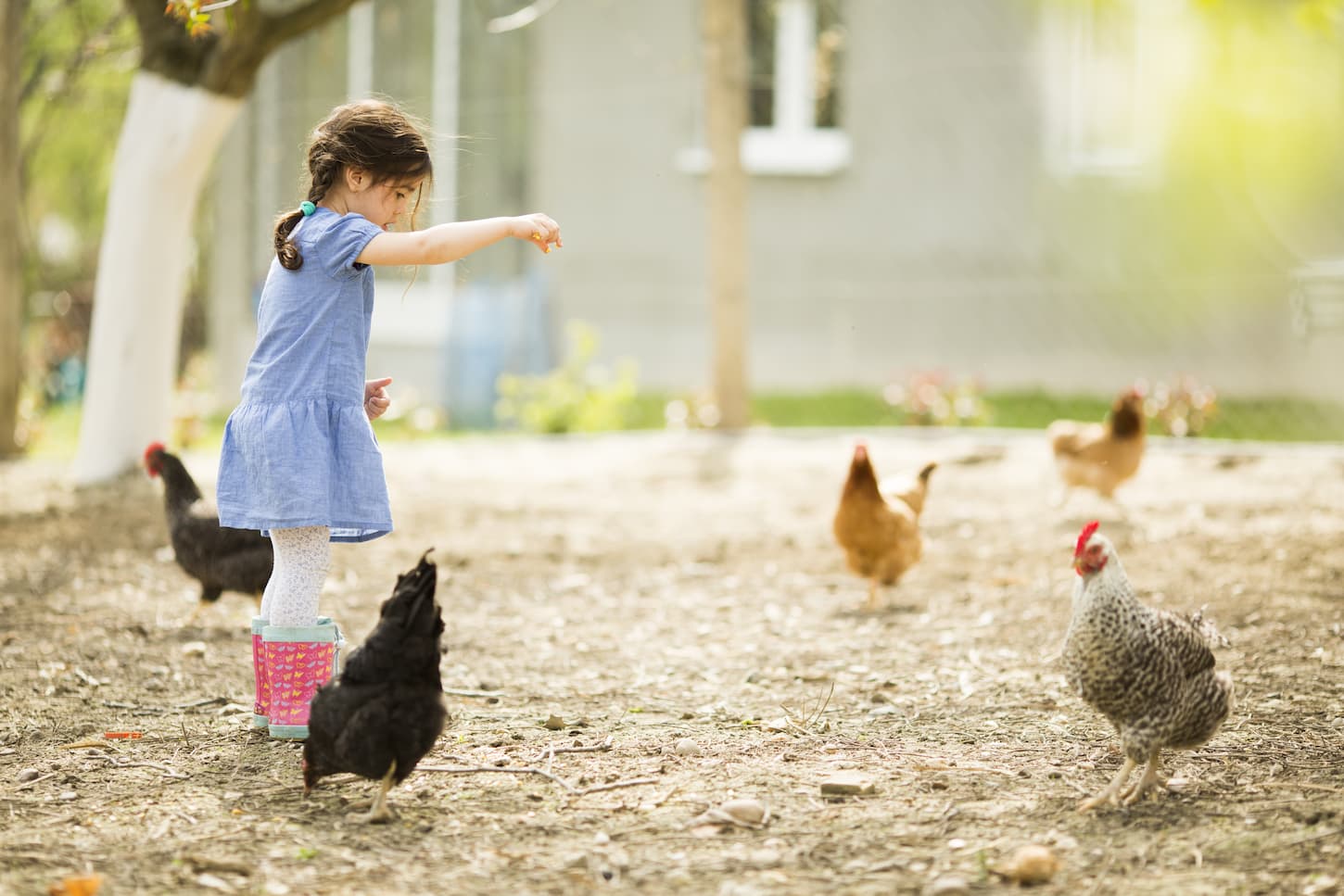
Feeding Chickens
Just like anything else, chickens need good nutrition to have a healthy and happy life. Here’s a collection of some of my top tips for doing so!
Something I advocate is feeding chickens a non-feed diet. With the right research and know-how, creating a nutritious diet for your flock isn’t too tricky. It can also be an affordable, sustainable, and exciting option for them!
If you’re thinking of doing this, please keep your chickens’ welfare at the front of your mind and consult your veterinarian if you notice unusual behavior or symptoms in your flock.
Just like the baby chicks, adult chickens need to have a constant supply of clean, fresh water. One problem that gets in the way of this is water going green, often showing a build-up of algae or harmful bacteria. Here are some great tips that’ll stop your chickens’ water from doing this!
And if you do need to use commercial feed to raise your chickens, please don’t feel bad. We keep some locally made commercial feed on hand to make sure our chickens stay healthy, too.
Entertaining your Chickens
To keep happy, chickens also need a little enrichment or entertainment. Bored chickens can develop behavioral problems, but you can avoid this by being a responsible pet owner and giving them something to do with their time!
Sometimes, despite your best efforts, chickens do get annoyed and start pecking each other. After all, they’re all their own creatures with their own personalities, and little arguments do happen.
If this happens to you, don’t panic! Here are some little tricks that can help.
Like any other welfare concern, please consult your veterinarian if your chickens develop serious problems that threaten their health.
Other Chicken Concerns
Sometimes things can happen that are a little out of your hands! I wanted to give you a heads-up on a couple of weather-related problems:
- Is Your Chicken Coop Muddy? Here’s What to Do
- How to Keep a Chicken Coop Cool in the Summer
- Does Weather Affect Chickens Laying Eggs? 17 Hen Secrets
I also think it’s a good idea to learn some basic chicken first aid so that you’re prepared for things like bumblefoot, minor injuries, and more.
We recently had to separate out a few chickens and apply some ointment and blue kote to two of our hens who’d been shown their place by a more dominant hen. Since then, the hens have recovered and the bossy chicken has calmed down.
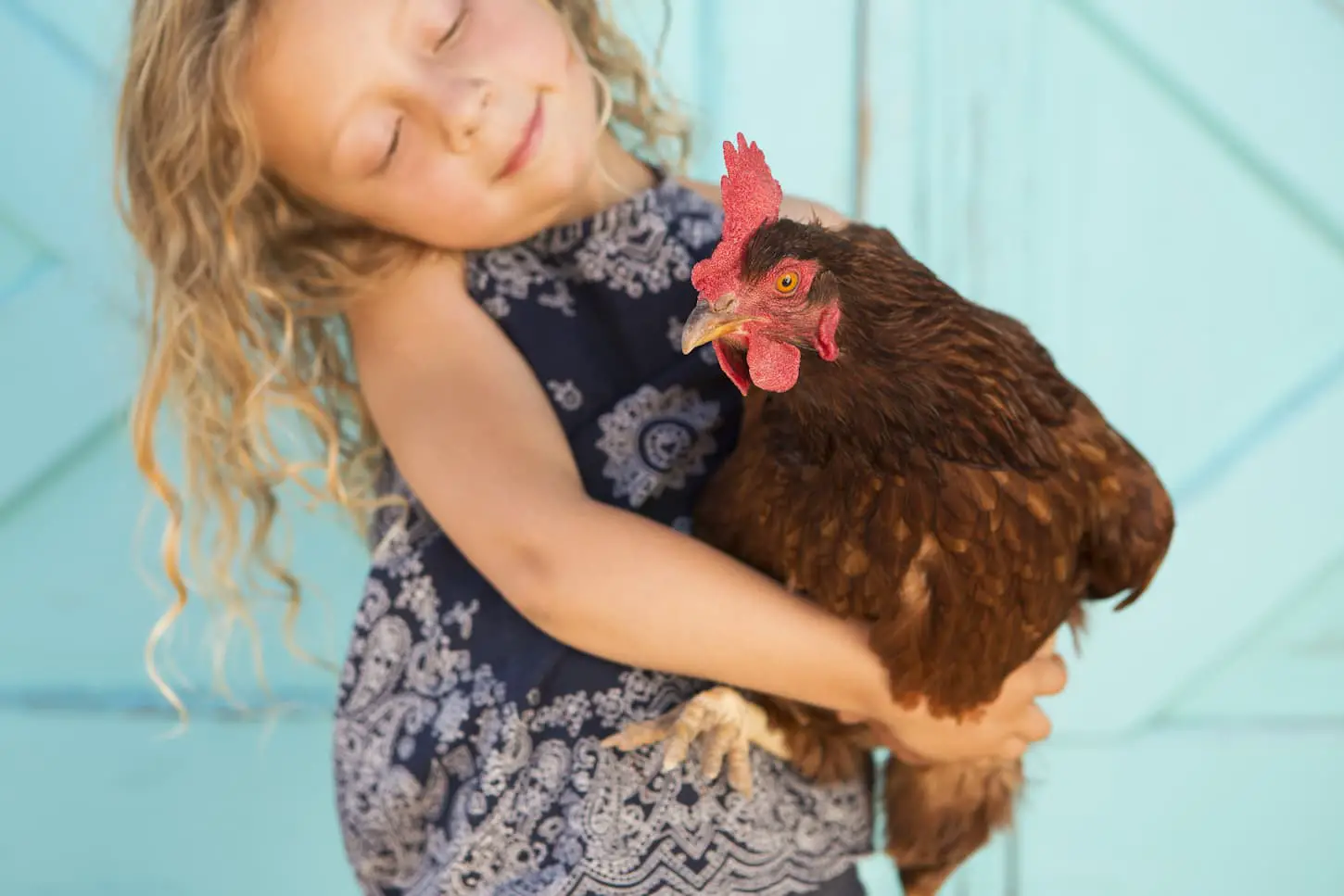
Do Chickens Like to Be Petted?
Chickens who have been well socialized to people will enjoy being petted, while chickens who are more skittish around people will run away and avoid being petted.
It’s not just dogs and cats that enjoy being petted. Chickens can enjoy it too!
However, they’re not as naturally accustomed to this as more traditional four-legged pets such as cats and dogs. Chickens should be approached slowly and carefully at first, to show them that it is in fact an affectionate thing to do not something to fear!
Care should be taken with children around chickens, as they can sometimes scare the chickens in a rush to show their excitement!
And keep in mind that socializing your chickens to enjoy being petted and held by humans starts when they’re chicks. So, make sure you spend plenty of time with your chicks and hold them when they’re cute and little. That way, you’ll be able to pet them when they’re grown, too.
Do Chickens Like to Cuddle?
Chickens who have been raised and socialized well may enjoy cuddling, though there are never any guarantees that a chicken will love cuddling people.
As well as being petted, some chickens like a little cuddle. When you become close with your flock over time, you learn each of their personalities, their own likes and dislikes, and how they prefer to interact with you.
There are no guarantees that your chicken will come to enjoy a little cuddling, but you can take it from me that it does happen frequently and is one of the sweetest things you can do to show your chicken you care for it!
Like anything with animals, take good notice of their behavior – chickens that flap and don’t want to be picked up should be given a little space, just as it’s nice to give those more social chickens the attention they crave.
Some behaviors like this are also more common in specific breeds of chickens. Read on to find out more about the friendliest breeds of chicken!
Are Chickens Friendly?
In case you haven’t worked it out by now, chickens are friendly animals well suited to be petted! Although many of them differ in their personalities, overall, a happy chicken will come to be friendly with its owner and other humans.
They can also be friends with each other and, in many cases, other animals too!
Our chickens are all quite friendly – and are very friendly to any visitors if we introduce them to our chickens. Once introduced properly, our chickens are more than happy to see any of our friends who may be stopping by.
Other chickens I’ve met, who maybe weren’t socialized as well, are still polite. But they go out of their way to avoid interaction with humans. So, we teach our children to respect those chickens’ space.
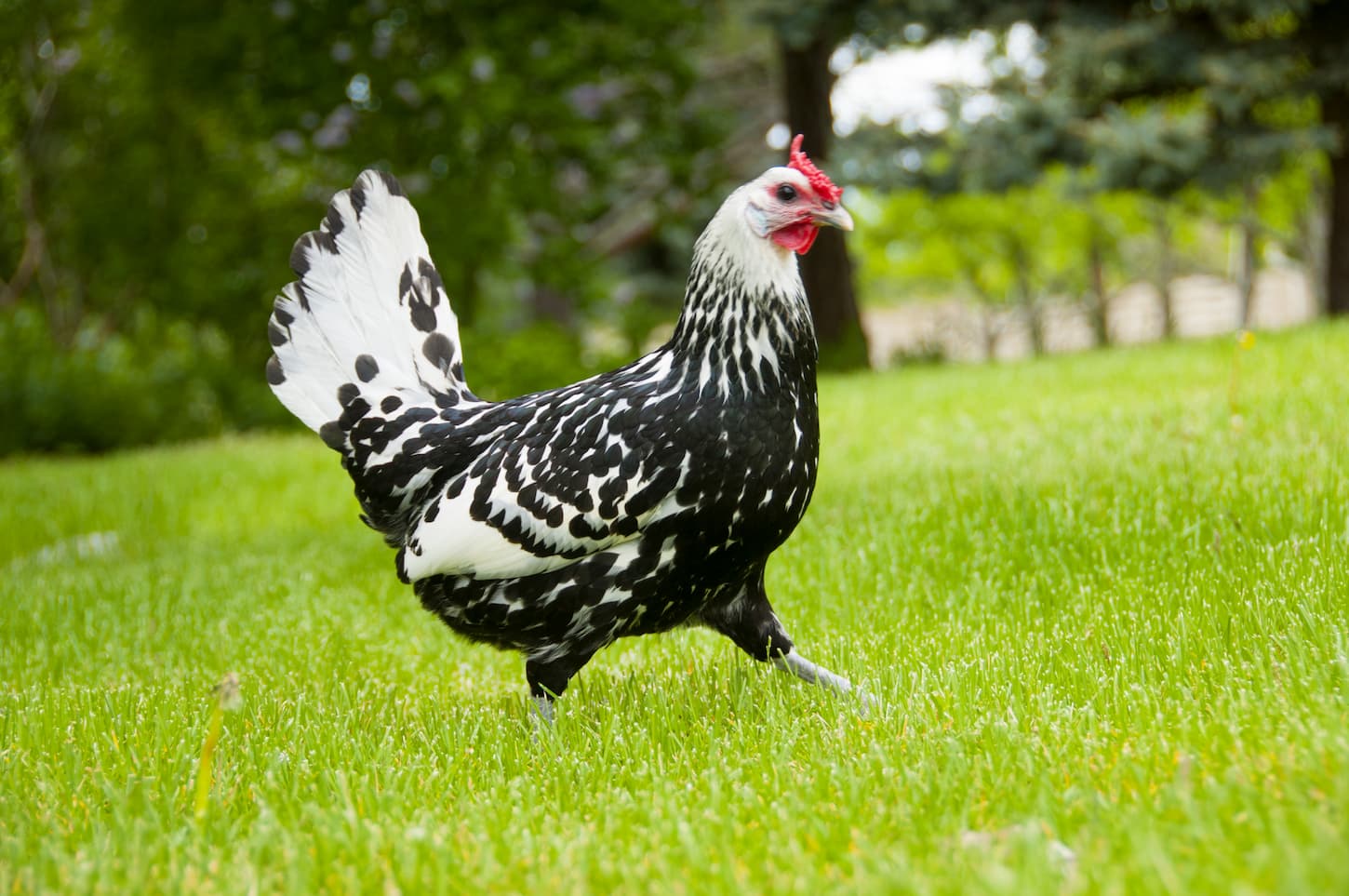
What Is the Friendliest Breed of Chicken?
In my experience, Americauna (Easter Eggers) and Buff Orpington chickens are the friendliest breeds, followed by Silkies and Rhode Island Reds. I have never found a breed of chicken that’s unfriendly, but those are my favorite breeds for friendliness.
It might surprise you to learn that, around the world, there are hundreds of breeds of chickens. Some breeds have been selected for their egg-laying, while others have been chosen for their size and meat. But what, I hear you ask, about friendliness?
As it turns out, some breeds of chicken are much more suited to the human company than others. Often, these chickens tend to be calmer and more docile personalities, but also are often bred to be fine-looking specimens! Here are my top six choices of friendly chicken breeds.
Americauna (Easter Eggers)
Americaunas are the beautiful mutts of the chicken world. They’re dual-purpose chickens (meaning they are great as meat birds and/or as egg layers). They’re also the friendliest breed I’ve ever owned or interacted with.
Silkies
Silkies are a popular choice as family pets, partly because of their unique, small, and cute appearance (and the soft feathers that give them their name). They’ve built up a great reputation as family animals, often friendly with children.
My sister-in-law owns several silkies and they’re her favorites. I love visiting the silkies at her house! They are just so cute and friendly.
Speckled Sussex
Compared to the silkies, a Speckled Sussex is a bigger, more classic-looking hen. This is something of an all-around breed, great for eggs while having a calm personality trait that makes it suitable as a family pet.
Buff Orpington
Buff Orpingtons, like the Speckled Sussexes, are great all-around chickens and are often kept as show chickens because of their smart appearances. They are often kept for both their eggs and meat and have the same calm personalities as the other breeds on this list.
We’ve only got two Buffs, but they are so friendly. The only downside to having a Buff is that it does tend to go broody quickly. But they’re so friendly that even the broodiness of the hen is quickly forgivable.
Rhode Island Reds
Did you ever wonder what Rocky, one of the main characters in Chicken Run’s surname is? Well, his full name is Rocky the Rhode Island Red. Another classic choice, Rhode Island Reds are iconic egg-laying machines, perfect if you’re after a chicken that’ll keep your kitchen stocked well.
We’ve got four Rhode Island Reds. One of them is the current top hen – and she’s a bit of a bully to the other chickens. But she and her red sisters are still super friendly to all of my family members and the flock who isn’t at the bottom of the pecking order.
Jersey Giants
If you’re after chickens that’ll do well around other pets, Jersey Giants might be a solid choice. These oversized birds are often big enough to not feel as nervous as smaller breeds, such as Silkies, might around other animals.
Jersey Giants are also somewhat less delicate creatures than smaller breeds (while remaining relatively docile), so are a great choice if you have kids who are likely to want to get involved.
The flip side of owning Jersey Giants is that, due to their size, you’ll need to give them a lot of space. Still, if you have plenty of lands to give them, they could be a great choice for you!
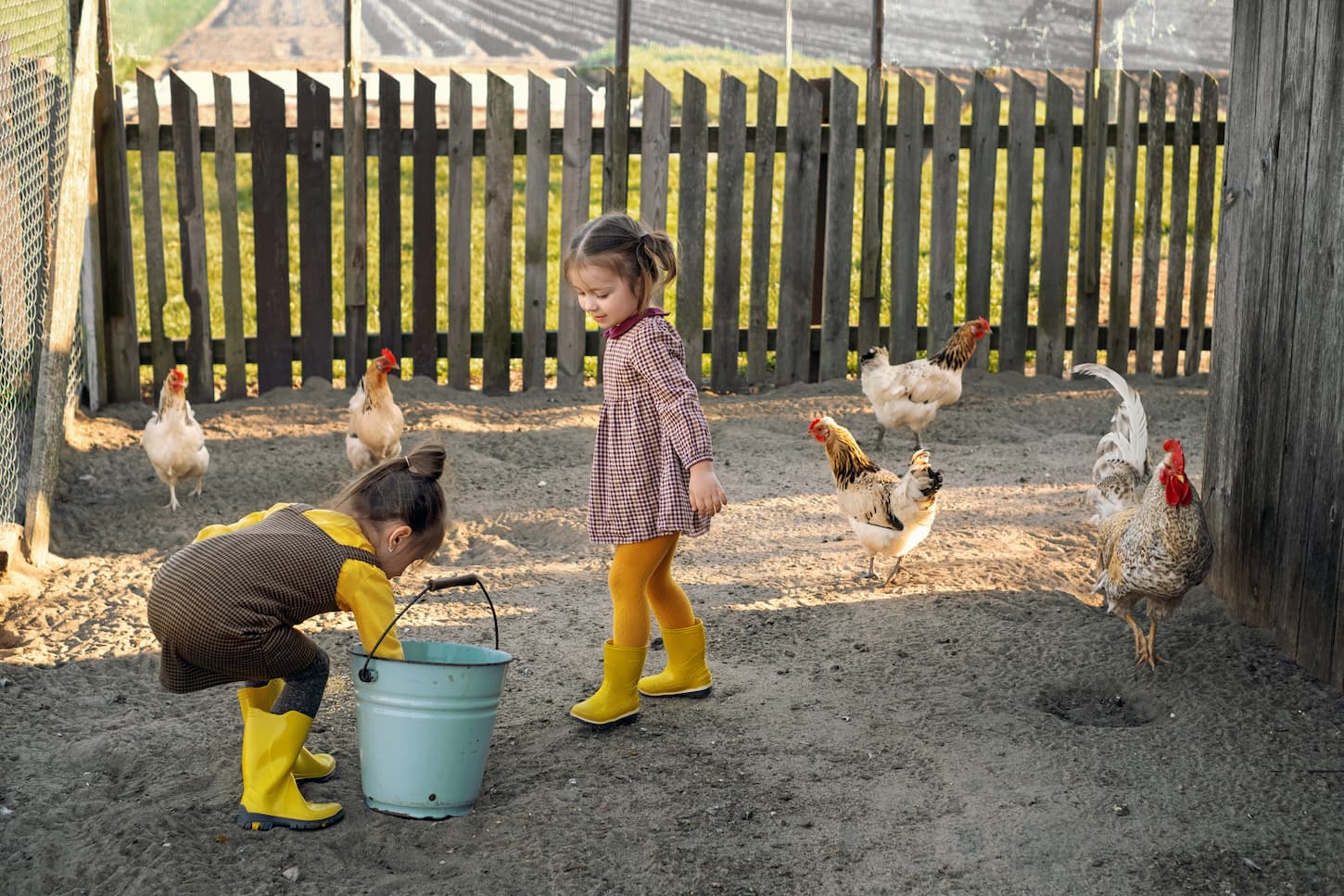
Do Pet Chickens Love Their Owners?
While we’re not entirely sure whether chicken brains work in the same way as other animals, we’re pretty sure that they can learn to appreciate their owners. Some chickens will follow their owners around and
can even learn to come when called by name!
Even if the scientists aren’t sure, anyone who owns a chicken will tell you that these are smart, curious creatures, and certainly capable of displaying affection once you’ve built up a bond with them.
There are actually quite a lot of interesting facts about how chickens see the world, and if you’re curious to discover more about whether they can feel emotions, check out the article below!
Do Chickens Get Along with Other Animals?
Chickens can get on with lots of other animals. Chickens can get along with rabbits, alpacas, goats, sheep, other smaller livestock, and even house pets.
Whether they actually do or not depends on the animals themselves.
- Our goats and chickens are our greatest friends. Just beware that goats love to eat chicken food, which isn’t super great for them.
- Our dog (who is a bird dog) mostly gets along with our chickens. He’s a horrible bird dog but a great chicken friend.
- On the other hand, our cat just wants to catch and eat one of the chickens. She’s an indoor cat, though, so we just keep her indoors or on her leash. Yes, we have a leash for the cat.
Here are some articles with tips for raising chickens with some other common (and less common) pets.
- 19 Tips for Raising Chickens and Rabbits Together
- How to Raise Chickens with Goats: 11 Tips that Work
- Can Alpacas Live With Chickens?
I’ve also got the ultimate guide to which animals can go together right here: Compatible Livestock: Which Animals Go Together?
It’s a large post with a lot of tables, so you may want to check it out from a laptop or an actual computer. If you want to read it on your phone or tablet, you will be able to still see it, but the tables will look better if you turn your device sideways.
Which Is a Better Pet: A Chicken or Another Bird?
If you’re trying to decide whether you should get chickens or another type of bird, you’ll have quite a lot to think about. Chickens make great first-time pets, particularly because they’re relatively low-maintenance animals and will give you eggs.
Other types of birds, such as parrots, are a whole other kettle of fish in terms of maintenance and commitment (did you know that some can live up to 100 years?!). Often flighty birds will struggle to get on with other household pets and can be noisy and messy.
However, like any pets, they can also be fun in a load of other ways, can become extremely highly trained, and even learn to talk.
While I can’t make the choice for you between chickens and other birds, I certainly can recommend keeping chickens – I know mine are fun, and friendly, and keep my cupboard stocked with delicious fresh eggs all year round!
Key Takeaways on Chickens as Pets
Whether you’re wanting to keep chickens as livestock, pets, or pets with egg benefits, they really are amazing animals. Sure, they’re a little bit silly, but that’s half the fun sometimes!
In any case, make sure you read this article about chickens in the rain. That way, you’ll know what to expect with your chickens in the wetter, rainier weather!
Resources
Learning from your own experience is essential, but learning from others is also intelligent. These are the sources used in this article and our research to be more informed as homesteaders.
- Backyard Homestead HQ Chicken Section
- Backyard Homestead HQ Youtube Channel
- Boyd, Rebecca Lowrey, and Rebecca Lowrey Boyd. “Why Chickens Make Good Pets.” Better Homes and Gardens, 27 Aug. 2020, www.bhg.com.au/why-chickens-make-good-pets.
- Coops, Backyard Chicken. “Why Keep Chickens As Pets?” Backyard Chicken Coops, 2021, www.backyardchickencoops.com.au/blogs/learning-centre/why-keep-chickens-as-pets.
- Roberts, Jason. “11 Reasons Why Chickens Make Great Pets.” Know Your Chickens, 17 June 2021, www.knowyourchickens.com/are-chickens-good-pets.
